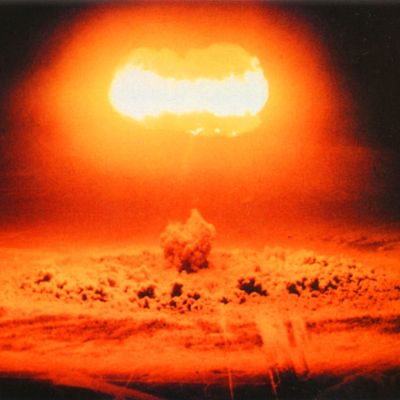
During the initial second-round Democratic presidential candidate debate in Detroit, an unusual question arose late in the evening when moderator Jake Tapper asked Elizabeth Warren about her proposal to “make it U.S. policy that the U.S. will never use a nuclear weapon unless another country uses one first.” In keeping with CNN’s provocative approach to the debate, Tapper volunteered that Warren’s proposal would force America to “tie its own hands with that policy.”
After letting Warren explain that a “no first use” policy would reduce the odds of accidental nuclear war without denying the U.S. anything it would actually do (at least under responsible leadership), Tapper turned, for some reason, to Montana governor Steve Bullock for a rebuttal, and got one, though it was tossed in a word salad:
I wouldn’t want to take that off the table. I think America’s strength — we have to be able to say that. Look, never, I hope, certainly in my term or anyone else, would we really even get close to pulling that trigger.
But by the same token, America’s strength — and, look, this president has made America first as America alone. Our allies no longer trust us. Our adversaries are with us. But going from the position of strength, we should be negotiating down so there aren’t nuclear weapons. But drawing those lines in the sand, at this point I wouldn’t do.
After a bit more back-and-forth between the two candidates (in which Warren mentioned Trump’s erratic and destabilizing leadership, and Bullock mentioned the need to deter overseas crazy people), the debate moved on, probably leading many viewers to wonder: What was that about?
Actually, as Fred Kaplan very thoroughly explains at Slate today, arguments for and against a “no first use of nuclear weapons” declaration go all the way back to the earliest stage of the Cold War, when a series of U.S. presidents from both parties believed it was critical to offer our allies an assurance that a Communist invasion would be — or at least might be — met with a nuclear response. The very specific context was the likelihood that Soviet forces could sweep through Western Europe before a conventional response from the U.S. would take shape, though the failure to threaten North Korea with nuclear weapons prior to its invasion of South Korea in 1950 was also an issue. As Kaplan recalls, you didn’t have to believe America would actually drop the Big One to think it was prudent to keep potential aggressors mindful of the possibility.
It wasn’t just a few crazy generals who made this argument. The leaders of West Germany and other European nations — civilian and military — believed it, too. The threat of nuclear first-use — the assurance that we would risk New York for Paris, or Washington for London — lay at the heart of the U.S. security guarantee for the NATO alliance. It was — and still is — called “extended deterrence” and the “nuclear umbrella.”
As Tapper noted in asking Warren the original question, Barack Obama considered shelving this Cold War approach and making a “no first use” declaration. But eventually he demurred, fearing negative reaction from allies and also acknowledging that first use of nukes might be appropriate if something even scarier — such as biological weapons — was first deployed by adversaries. Obama did change policy somewhat, though:
He came up with this formula: The United States would not use nuclear weapons first against countries that (a) did not possess nuclear weapons and (b) had signed, and were abiding by, the Non-Proliferation Treaty. This preserved the option of going first against what many considered the main threats—Russia, China, North Korea, and (if it ever developed a bomb, as it seemed to be doing at the time) Iran.
That became U.S. policy — and, though few noticed, the Trump administration’s Nuclear Posture Review, signed in 2018 by then–Secretary of Defense James Mattis, preserved that language precisely.
Tapper naturally asked Warren about this issue because she earlier made it part of her very extensive agenda for addressing most if not all challenges facing the country, as my colleague Eric Levitz explained in February:
In a bold and controversial move, Elizabeth Warren introduced legislation this week that would revoke Donald Trump’s existing authority to trigger a nuclear holocaust whenever he feels like it. The “No First Use Act,” which Warren co-authored with House Armed Services Committee Chairman Adam Smith, would legally establish that it is the policy of the United States to never be the first power to use nuclear weapons in an armed conflict.
It appears that Warren concluded the balancing test Obama went through before deciding against a “no first use” declaration might have a different outcome when you factored in President Donald Trump. Tapper wanted to know why Warren wanted to “tie America’s hands.” The implicit answer is that tying the particular hands of this particular president might be a good idea for national security and global peace. It’s possible Warren was thinking about Trump and Bullock about himself as president, when both answered the “no first use” question. But it will be interesting to see if the question comes up in later debates, given the enormous number of foreign policy and national security questions that will not be asked.






























